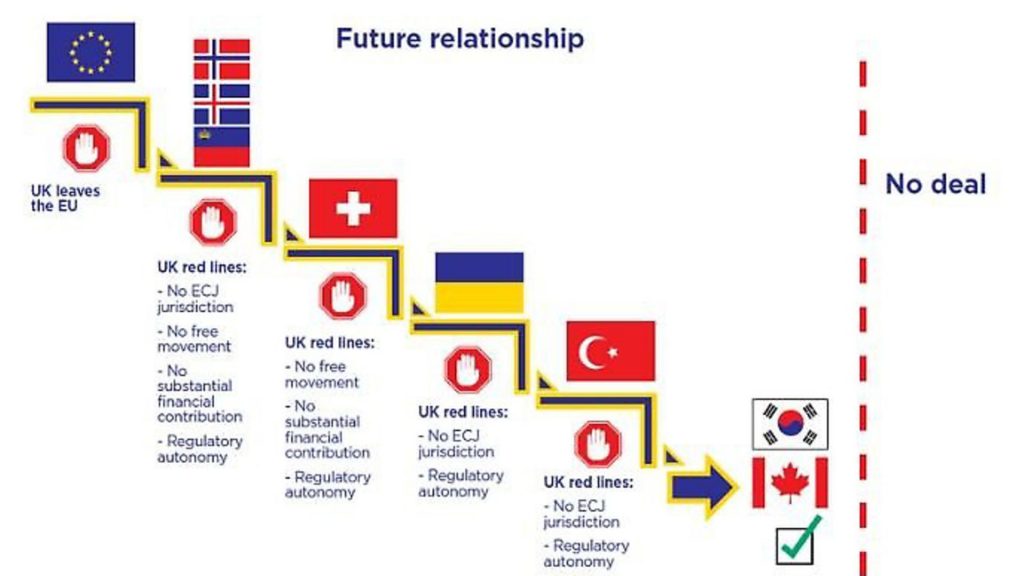
JAMES BALL on the Tory Brexiteer’s realisation that Britain does need experts after all.
Britain’s Brexiteer government, it seems, hasn’t had enough of experts after all.
In an interview this week, Iain Duncan Smith – the former Conservative leader and prominent hard Brexit backer – made the staggeringly original observation that the UK hasn’t done a trade deal in 40 years, and is now trying to complete one with its largest trading partner in just ten months.
There are issues with doing that, he realised. “One of them is the quality of the people now working on this,” he said. “If you haven’t negotiated for 40 years you need to reach out to all those people that are involved in negotiations, really good transactional lawyers that exist in the City of London. Proper trade economists. We’ve got very good ones at the moment but we need to bring them in from outside.”
The UK is privileged to be gifted with men of the intellect and foresight of Iain Duncan Smith in their parliament, who realise a mere three-and-a-half years after voting to leave the European Union that we will need expert help to negotiate with it.

If the UK had only had some impossible, higher level of genius that could’ve warned this earlier, of course, things might have been different. The government might have been able to set aside the huge cost of this kind of expert, engage a worldwide recruitment drive to secure them, or hire at least some of them before the private sector (or worse, the EU) did so. But alas, Duncan Smith was our first warning.
That lack of warning is a greater tragedy than any of us could have known, given the UK and EU have published their negotiation plans this week, and it turns out trade deals might not be as quick or as simple to do as we had universally believed up to this point.
The details, in fact, turn out to be incredibly complex – but some of the issues at stake are fundamental. Given we have had our food, safety, and employment standards aligned with the EU for decades, EU nations are worried about a near-neighbour undercutting them.
MORE: Iain Duncan Smith says it’s time for experts to handle Brexit as ‘there are problems ahead’
This is enough of a concern that they’d ideally like us to stick to their standards in the future, even if we change them. At a minimum, they want us to stick to their current levels if we want anything but the most basic of trade deals.
The government, looking to secure ‘wins’ in the form of deals with other countries we trade with far less – not least because they are thousands of miles away – has been betting the house on being able to change these standards.
This is, it turns out, quite the impasse – and one we have somehow only learned of for the very first time after we have made Brexit irreversible (at least for a few decades) and will require the government to bite a bullet. Does it give up on bold new trade deals in exchange for a close trading relationship with 27 countries on our doorstep – in which case, what was Brexit for, again? – or does it take a huge economic hit and accept a chilly distance from our near neighbours?
For a time it seemed as if the government had found a bold new trick to escape the horns of this dilemma: the official Number 10 press account unearthed a single PowerPoint slide from Michel Barnier, prepared for the media several years ago, indicating a Canada-style deal would be open to the UK, and require less alignment than we have at present.
Day saved, surely? But it was not to be: in a deeply unfair move, the EU noted that a PowerPoint slide is not, in fact, a legally binding substitute to months of detailed trade negotiations, and it turns out in bilateral negotiations there is no referee or teacher to appeal to. Brilliant though the British ruse was, it somehow failed.
This leaves us as a nation in a position we could, surely, never have foreseen. We don’t have the experts or the detailed planning in place for what would be among the most rapid trade negotiations in modern history. We have fundamental disagreements on core principles of our future trading relationship. We have a ticking clock – the possibility of an extension disappears in a matter of months, and without it our current arrangements expire at the end of this year.
We are also, it transpires, negotiating with one of the most notoriously ferocious trading blocs in the world – who have, unlike us, somehow already hired the legions of trade experts, economists, and others that Duncan Smith has warned us we need. It’s almost as if they knew the talks would end up this way.
Warning: Illegal string offset 'link_id' in /mnt/storage/stage/www/wp-includes/bookmark.php on line 357
Notice: Trying to get property 'link_id' of non-object in /mnt/storage/stage/www/wp-includes/bookmark.php on line 37







